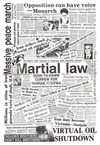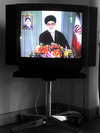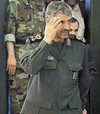Mousavi and Martyrdom
by POUYA ALIMAGHAM
06 Feb 2010 02:0818 Comments
 How the regime calculates the personal challenge.
How the regime calculates the personal challenge.
[ opinion ] Columbia University professor Hamid Dabashi considers Iran's Green Movement a civil rights struggle. Others contend that there is a revolution under way aimed at radically altering the country's political landscape. The latter opinion largely rests on the many parallels between today's protest movement and that of the Iranian Revolution that swept away the monarchy more than thirty years ago.
Eight months after presidential candidates Mir Hossein Mousavi, Mehdi Karroubi, and large segments of society decried the June 12th presidential election results as fraudulent and launched a sustained protest movement, countless reasons abound as to why the movement is not yet a bona fide revolution. The focus here is on only one such reason: The ironic impact of the physical presence of the movement's leadership in Iran, which effectively inhibits Mousavi's ability to elevate the movement to its political potential.
The history of the Iranian Revolution sheds light on the counter-intuitive effect of Mousavi's domestic presence and its capacity to preclude the movement from reaching its full culmination.
In 1963, 15 years before the Iranian Revolution changed the nation's direction, Ayatollah Ruhollah Khomeini came into political prominence by opposing, first, the Shah's White Revolution, and, second, the awarding of capitulation rights to the United States.
As a dissident living inside Iran and within reach of the state's security apparatus, Khomeini tempered his criticisms, limiting them to only certain policies such as the capitulation rights, and even invoking the monarchical constitution to bolster his objections: "The constitution has been bought with the blood of our fathers, and we will not permit it to be violated." His continued defiance after his arrest and subsequent release from prison prompted the Pahlavi state to eventually exile him in 1964, when Khomeini went to Turkey and then to Iraq, where he spent most of his exile.
In neighboring Iraq, Khomeini enjoyed immunity from the Shah's feared security forces and escalated his opposition. At the same time, the aged cleric was close enough to afford his devoted followers access to his fiery sermons, which were transmitted to Iran through tape recordings or leaflets. Thus, while keeping a safe distance from the Tehran regime, he no longer confined his stinging criticism to specific policies, but to the political system as a whole. It was in this period that Khomeini formulated his transformative blueprint for modern Iran. Indeed, in 1970, he laid out his ideology for a radically different system of governance by penning Hokoumat-e Islami -- or Islamic Government.
For as long as Mousavi remains in Iran, it will prevent him--as it did Khomeini half a century ago--from realizing his full leadership potential. He will continue to keep his rhetoric confined to the system parameters, which is a limitation that some of his more radical supporters abhor as they demand the removal of the non-republican governmental institutions.
For its part, the government is well-versed in its own revolutionary history. The regime has not exiled Mousavi in order to obstruct his capacity for unrestrained expression from a safe haven. Nor have they arrested and tried him for sedition--a capital offense--thus averting an inspiring martyrdom.
Consequently, Mousavi remains in Iran, exposed to the state's psychological warfare. Not arrested or killed; the threat of harm is even more effective under the circumstances.
By keeping the threat of punishment looming over his head, the state's intimidation strategy limits Mousavi's proclamations, which might help explain why he continues to criticize the government within the framework of the constitution--just as Khomeini did in the 1963-64 uprising.
Less than two weeks after the protests began in June, Ali Shahrokhi, the head of parliament's judiciary committee threatened, "Mousavi's calling for illegal protests and issuing provocative statements have been a source of recent unrests in Iran ... Such criminal acts should be confronted firmly." In early July, the Basij militia wrote a letter to the country's chief prosecutor "accusing Mousavi of involvement in nine offenses against the state, including 'disturbing the nation's security.' That charge carries a maximum 10-year prison sentence." As recently as December, after the Ashura protests, members of parliament called upon state authorities to arrest Mousavi because he and other leaders "must not remain on the sidelines and be safe."
The Islamic regime will not transfigure Mousavi into a martyr by arresting and trying him for sedition, nor will they exile him so that he can speak freely and escalate his rhetoric to revolutionary heights. By holding him in Iran, subject to interminable threats, chilling statements, and constant harassment, the government ensures that Mousavi and his movement are limited in scope and potential. And although the Green Movement has revealed a highly decentralized organizational model, effective leadership is, nevertheless, critical to its ability to negotiate an outcome that produces dividends, revolutionary or otherwise.
Pouya Alimagham is a doctoral candidate at the University of Michigan.
Copyright © 2009 Tehran Bureau































18 Comments
Mousavi is a thing of the past and an inseparable part of the Islamic Republic. He can no longer assume a position of leadership for a movement that looks beyond the Islamic Republic. Iran has no future with its current regime.
Niloofar / February 6, 2010 3:31 AM“the state's intimidation strategy limits Mousavi's proclamations, which might help explain why he continues to criticize the government within the framework of the constitution”
The emphasis on the observance of the rights, that the constitution offers, in my view bespeaks political ingenuity, maturity and talent.
The Mousavi-interview (Kalehmeh.org) is an excellent sort of taking stock of the present political concepts of the “green” democratic and social movement, assessing some past, but momentous events and features (which might be interpreted as a way of dealing with issues having arisen since the movement’s post-election beginning) :
The Iranian revolution under Khomeini, its contents, methods, outcome and results have to be scrutinized and put to the test;
military and armed forces are not to be fought via military or terroristic means, but must somehow be won over (example of the Shah-military quoted);
the existing political scene can and must be won over by the social and political movement (the “Greens”)
the “green” movement is a new type of movement: it is not a separate political party to be identified as such, but a broad political and social movement which develops independently of any supposed leader-figures via broadly-based democratic discussions, ideas and decisions;
the movement’s clientele are all Iranian citizens, but in particular the disadvantaged lower social classes supported by the intellectually and creatively active spectrum of the population;
the “green” movement is constitutional and one of its main political weapons is its insistence upon the observance of the constitutional rights, rules and regulations, in other words and in particular:
• the freedom of the press
• “habeas corpus”,
• court trials deserving that name
• questioning of the death sentence
• freedom, justice and a (an Islamic) republican system
• social justice as part and parcel of political freedom
• the strict observance of the Montequieuan separation of the powers of the the legislative, the executive and the judiciary force
• religion not to be (mis)used and/or instrumentalized by the executive power(a cautious approach towards the separation of state and church/religion)
• forcing and pushing back the unconstitutional infringement of the legislative and judiciary power by the security and military forces
• strengthening of the reliability and stability of the various administrative institutions within their constitutionally fixed functions
• the strict adherence to the constitution does not foreclose any future consensual amendments to the constitution
Publicola / February 6, 2010 6:21 AM"nor will they exile him so that he can speak freely and escalate his rhetoric to revolutionary heights" The writer here assumes three things: that Mousavi would WANT to take his rhetoric to revolutionary heights, AND that besides the expats who roam around waiting for "revolution" while they sit on their couch and watch on their TV screens, a good majority in Iran WANT it too (no, youtube videos and your family dinner parties do not indicate what the majority of Iranians want)... AND, lastly, he also assumes that that is in the best interests of the country.
None of these assumptions have ever been verified.
The comparisons with Khomeini are just catastrophic ... since that ended up so well, we should go down that road over again?
Pedestrian / February 6, 2010 8:54 AMThe total loss of legitimacy via the annulment of the elections and the suspension of what democracy existed has left the coup factions short of options. It is their scope that is limited. It is their hope that the population develops collective amnesia,that the price of oil, in a stroke of luck, skyrockets or a war appears on the horizon. They need all three to occur if the situation can ever go back to the way it was. In addition, they need young people to cease to be what they have have always been and will always be. In other words, they need the impossible to happen, they need life to stop.James Joyce famously said, ' history is a nightmare from which I am trying to awake'. It can be an uncontrollable nightmare.The 'engineer' versus the 'engineers of the human soul'
pirooz / February 6, 2010 10:31 AMOne glaring difference between Khomeini and Moussavi, is that Khomeini was never part of any monarchical system, while Moussavi has been an important figure in the history of the Islamic Republic and started a reformist challenge from w/in the system. It's not clear if he would really want to "escalate his rhetoric to revolutionary heights," even if he could.
Furthermore, while being abroad may have allowed a radicalization of Khomeini's rhetoric, it also meant more difficulty in getting his message to potential followers inside Iran, where it mattered. Maybe that's one reason it took him 15 years to be a widely-acknowledged leader.
maghshoosh / February 6, 2010 2:51 PMThank you Mr Alimagham. The regime by confining Mousavi within his limited framework and by arresting or silencing all domestic opposition figures is creating a situation that the demands of the movement inside Iran is increasing exceeding those of its leadership.
The regime may believe this can dissipate the movement and contain the situation. The outcome however can never be guaranteed and the impact and experiences of this period cannot be erased from people's lives and memories. One very high likelihood is that the frustrated and headless movement will coalesce around leadership offered outside the country which could not only lead to civil war and/or the eventual downfall of the IR, but this could happen under a leadership whose guiding principles may not be the welfare and security of Iranian people.
Gorg O'meesh / February 6, 2010 4:13 PMAnother thing to keep in mind is that Khomeini intended to drastically change Iran's regime while Mousavi does not have such intentions. He was after all one of the original revolutionary figures that made Iran's government what it is today!
Amir / February 6, 2010 6:35 PMThis article is premised on the (huge) assumption that Mousavi IS the leader of this movement. I'm not sure that is at all the case. With or without him, the movement will go forward. All that is needed is some "spark" for it to finally push the ruling junta over the edge.
peatdit / February 6, 2010 7:18 PMTerrific analysis.
Sohrab Ahmari / February 6, 2010 7:28 PM"Another thing to keep in mind is that Khomeini intended to drastically change Iran's regime while Mousavi does not have such intentions."
Well, I think the article was implying that we cannot know Mousavi's real intentions because of his domestic predicament. Like Khomeini "tempered" his criticisms while in Iran and radicalized them after he went into exile, we can't fully know what Mousavi wants to say while he is under the threat of violence in Iran.
"This article is premised on the (huge) assumption that Mousavi IS the leader of this movement."
I think the last line of the article explains why his leadership is both necessary and visible while conceding that Mousavi is not controlling events in Iran: "And although the Green Movement has revealed a highly decentralized organizational model, effective leadership is, nevertheless, critical to its ability to negotiate an outcome that produces dividends, revolutionary or otherwise."
Abbas / February 6, 2010 9:32 PMIt is interesting that, from a security point of view, Mousavi is provided armed guards and the use of armored SUVs, all by the state. And Karoubi retains the use of armed personal guards, and has even kept the use of armored SUVs.
(This is all from the latest info I have gathered. If it has changed, please direct me towards the evidence.)
This, in itself, can be interpreted as a limited form of tolerance within the system.
Personally, I sense that there is nowhere near a majority of Iranians inside Iran desiring revolutionary war (or civil war) the likes of which the exile community is cheering for, whether they're aware of such an outcome to their desires or not.
Please see the following findings:
http://www.worldpublicopinion.org/pipa/articles/brmiddleeastnafricara/652.php?nid=&id=&pnt=652&lb=
Pirouz / February 6, 2010 10:18 PMExcellent article. Mousavi was one of the originals with Islamic Republic but he stop working with them almost 23 years ago, when he saw it is leading to a dictatorship system. he started what is now called the reformist or Green movement and as the author claims is the leader of this movenment. furthermore, Mousavie believes that revolution that happened in 1979 is still ongoing and this is evolution of that movement and the constitution that he agrees with can be changed in a democratic system with amendments that can limit the powers of religion and the so called Velayat (religious leader). In my opinion, This is the best course of action with less blood shed and I agree with Mr Dabashi assessment that we are in a period of civil movement that is continuation of our 1979 revolution.
Mansour / February 6, 2010 10:52 PMWhat does Mousavi reaching his full leadership potential mean? You use this term without defining it and thus your analysis rests on one huge faulty assumption, which is Mousavi even seeks to challenge the government. Mousavi is challenging Ahmadinejad and his administration (dolat), but not the government of Islamic Republic (hokomat), which he is a part of. And your analysis fails to consider Karroubi which is present in Iran yet has lambasted the prevailing political climate and exposed the infamous rape cases at Kahrizak. And what makes you think they wont exile or transfigure Mousavi. You suffer from historical amnesia. They did same to Bani Sadr. And Iranian state media is already comparing him to Bani Sadr. Last but not least I disagree with your conclusory statement. As an anarchist it is precisely because this movement has been decentralized it has been effective. Not only that, but the moment it acquires "leadership" it will then be stole by some charlatan opportunist.
Babak Shirazi / February 7, 2010 12:42 AM@ Pirouz
Re: Moussavi and karoubi's government sponsored protection and... "This, in itself, can be interpreted as a limited form of tolerance within the system."
Moussavi and karoubi are given armed protection and are not arrested for one reason: Khamanai is afraid to make martyrs out of them and fears eruption of the country if some thing happens to them. For the same reason, they have not been arrested. So it has nothing to do with "limited tolerance".
But let's say for the sake of argument that you are right. If this regime can barely show "limited form of tolerance" to Khomeini's "light of my eyes" Moussavi or former speaker of parliament Karoubi (who cheered executions of 88), then God help the rest of us... What kind of a system is this!
Pirouz,
Forum after forum you, an Ahmadinejad apologists defend this regime. Yet you, a "half American son of a Korean War Vet" (unlikely) living in the US, enjoy all the benefits of free press, free thought, free speech, free religion and yet you don't understand that people in Iran deserve the same rights and aspirations.
Do you really believe Ahmadinejad has the majority of Iranian support?
Small town of Lar in Southern Iran erupted against AN gov't this week. Yet Ahmadinejad got " 67% " of the votes of city of Lar!!! where is your 67% Mr. A.N. apologist?
Your president is busing bassij in from every town and village in Iran to fill Azadi sq on 22 bahman. They try to intimidate every one else with threats of beating, prison and execution. Where is your 64% support Mr. A.N. apologist?
Ahvaz / February 7, 2010 8:39 AMMousavi's interview is an impressive summary and appraisal of the different motives, demands and aims of the "green" movement on the eve of and in preparation for 22 Bahman.
Exactly one year ago - on the occasion of 22 Bahman - appeared the impressive text ”30 years ago …“ by the Iranian Blog authoress „naj“on her website „neo resistance“.
This moving account of insurgent Iran during the days that shook the world is to be found via the link:
• http://iranfacts.blogspot.com/2009/02/30-years-ago.html
website: “neo-resistance”; author: “naj” – Thursday, Februar 12, 2009
Publicola / February 7, 2010 12:07 PMI must agree with the points that Abbas makes. It's true, the author is assessing the potential of the movement if this were to occur. In order to make a hypothesis, one must make certain assumptions, especially when there is such a lack of information (read legit, unbiased).
DC / February 7, 2010 3:01 PMI for one like the fact that this is a movement of the people rather than that of a leader with radical ideas. Radicalism, even with good intentions, will ultimately end negatively. I'm really happy that both Karoubi and Mousavi continuously preach non-violence. That is the power of the Greens.
@Pirouz:
The survey done by worldpublicopinion.org is not a very good one. It uses old information (from around the time of the election) and the information was gathered solely by phone calls. That's not a very reliable research method and I don't have to explain why.
DC / February 7, 2010 3:06 PMI am in the minority but absolutely believe that the analogy between 1979 revolution and today's movement are most dissimilar in important aspects. Whereas in 1979 apart from the Royal Guard, the army, mainly made up of conscripts from the rural poor communities, had no incentive to fight the the people who were mainly of the same background, poor and religious. This time the military and Basiij have much personal incentive to support the regime and they will kill tens of thousands to keep their regime going.
I fear the present movement is just that and eventually will surrender to brutal force. How many enlightened and educated young are there to sacrifice their life for a dream? May be a lot and I hate to see them all go to waste.
Anonymous / February 8, 2010 4:31 AM